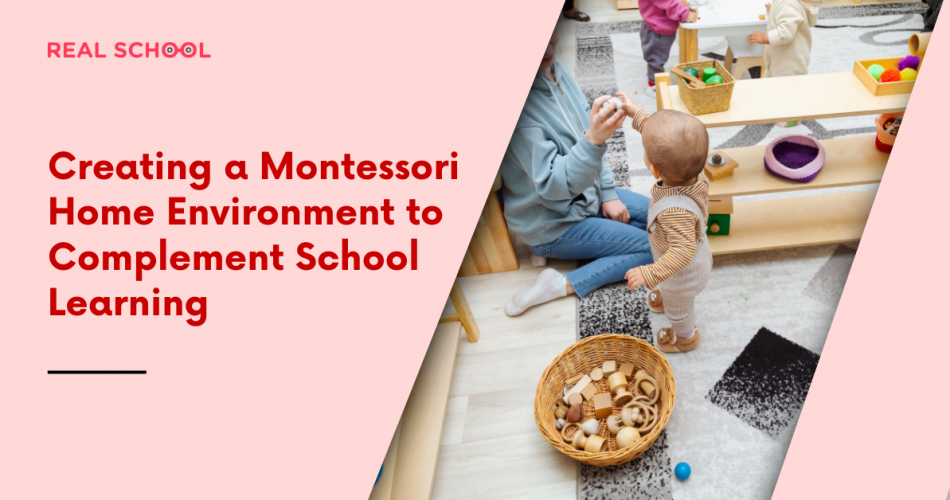Introduction
The Montessori philosophy goes beyond the classroom walls, extending its principles to the home environment. A Montessori home provides children with continuity in their learning journey, supporting and reinforcing the educational experiences they have at school. In this article, we will explore practical ways to create a Montessori-inspired home environment that complements and enriches a child’s Montessori school learning.
-
Encourage Independence
At the core of Montessori education is the promotion of independence in children. In a Montessori home, encourage your child to take on age-appropriate responsibilities. Create accessible spaces for them to hang their own coats, put away their belongings, and prepare simple snacks. Supporting independence at home reinforces the lessons learned at school and empowers children to be confident and self-reliant.
-
Design Child-Centered Spaces
Just like Montessori classrooms, a Montessori home should be child-centered. Designate specific areas for different activities, such as a reading nook, an art station, and a play area. Organize toys and materials on low shelves, making them easily accessible to your child. By creating inviting spaces that cater to their interests, you foster a love for learning and exploration.
-
Incorporate Montessori Materials
Introduce Montessori learning materials in your home environment. You can find or make Montessori-inspired materials like the Movable Alphabet, Sandpaper Letters, and Number Rods. These materials encourage hands-on learning and help reinforce concepts learned at school. Rotate the materials periodically to maintain your child’s interest and keep the learning experience fresh.
-
Foster a Love for Nature
Montessori education emphasizes a connection with nature. Incorporate nature into your home environment by bringing in plants, exploring outdoor spaces, and engaging in nature-inspired activities. Foster a sense of wonder about the natural world, as this aligns with the Montessori philosophy of cultivating curiosity and respect for the environment.
-
Encourage Practical Life Activities
Practical life activities are an essential part of the Montessori curriculum. Incorporate these activities into your daily routines at home. Involve your child in meal preparation, setting the table, and cleaning up after meals. These activities promote practical skills, fine motor development, and a sense of responsibility.
-
Promote Order and Organization
A Montessori home is characterized by order and organization. Encourage your child to keep their space tidy and organized. Provide labeled storage containers for toys and materials, helping your child develop a sense of order and responsibility for their belongings.
-
Foster a Love for Reading
Reading is highly valued in Montessori education. Create a cozy reading corner in your home, filled with age-appropriate books that pique your child’s interests. Spend quality time reading together and model a love for books and learning.
-
Encourage Open-Ended Play
Limit the use of electronic gadgets and toys that have a single, predetermined purpose. Instead, provide open-ended toys and materials that encourage imaginative play and problem-solving. Simple toys like blocks, building materials, and art supplies stimulate creativity and innovation.
-
Promote a Peaceful Environment
Create a peaceful and calm environment at home. Avoid unnecessary noise and distractions during designated play and learning times. Peaceful surroundings promote concentration and focused learning experiences.
-
Be a Supportive Observer
As a parent, observe your child’s interests and learning preferences. Follow their lead and provide support when needed. Montessori education values a child’s natural curiosity, and being a supportive observer allows you to adapt the home environment to suit your child’s evolving needs.
Conclusion
Creating a Montessori home environment enhances and complements the learning experiences children have at school. By fostering independence, incorporating Montessori materials, promoting order, and encouraging practical life activities, you provide your child with continuity in their educational journey. A Montessori home nurtures a love for learning, independence, and self-discovery, setting the stage for a lifetime of growth and exploration.
FAQs (Frequently Asked Questions)
Can I implement Montessori principles at home if my child attends a non-Montessori school?
How can I involve my child in everyday activities to promote independence and practical life skills at home?
What are some examples of Montessori-inspired materials I can create or find for my child at home?
How can I balance screen time with open-ended play and learning activities at home?
How do Montessori principles align with the concept of fostering a growth mindset in children?







